Promoting Sexual Health Among Teenagers with Learning Disabilities
VerifiedAdded on 2019/12/03
|13
|3858
|196
Report
AI Summary
This assignment aims to promote sexual health among teenagers with learning disability, who are more prone to negative consequences of unprotected sexual behavior. It discusses two theories that play important roles in promoting sexual well-being: Social Learning Theory and Theory of Reasoned Actions. Additionally, the Health Belief Model is explored to understand the use of condoms during sexual activity to prevent HIV. The role of health professionals in promoting sexual health among disabled teens is also highlighted, along with policies and provisions that can help promote sexual health and prevent HIV.
Contribute Materials
Your contribution can guide someone’s learning journey. Share your
documents today.
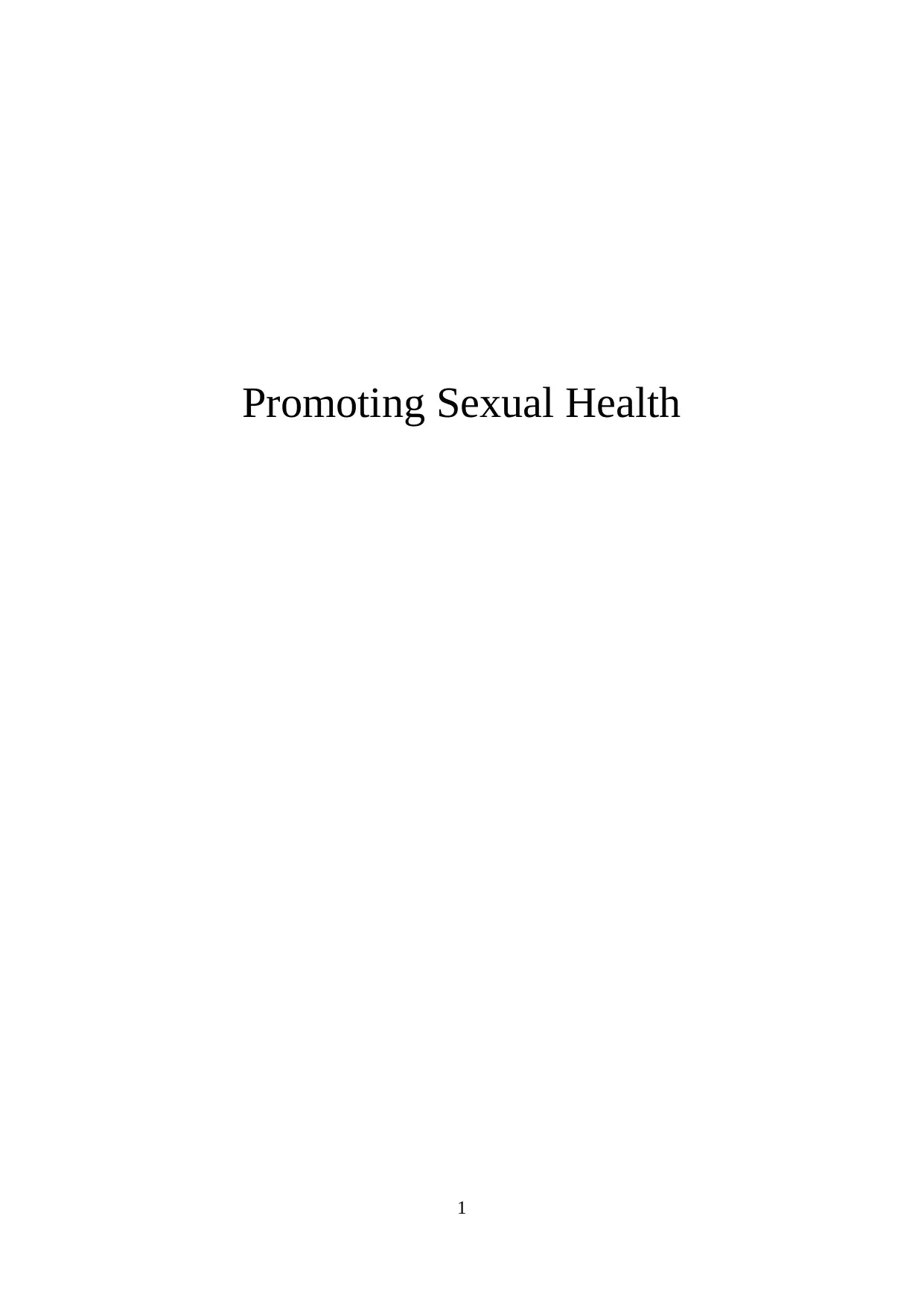
Promoting Sexual Health
1
1
Secure Best Marks with AI Grader
Need help grading? Try our AI Grader for instant feedback on your assignments.
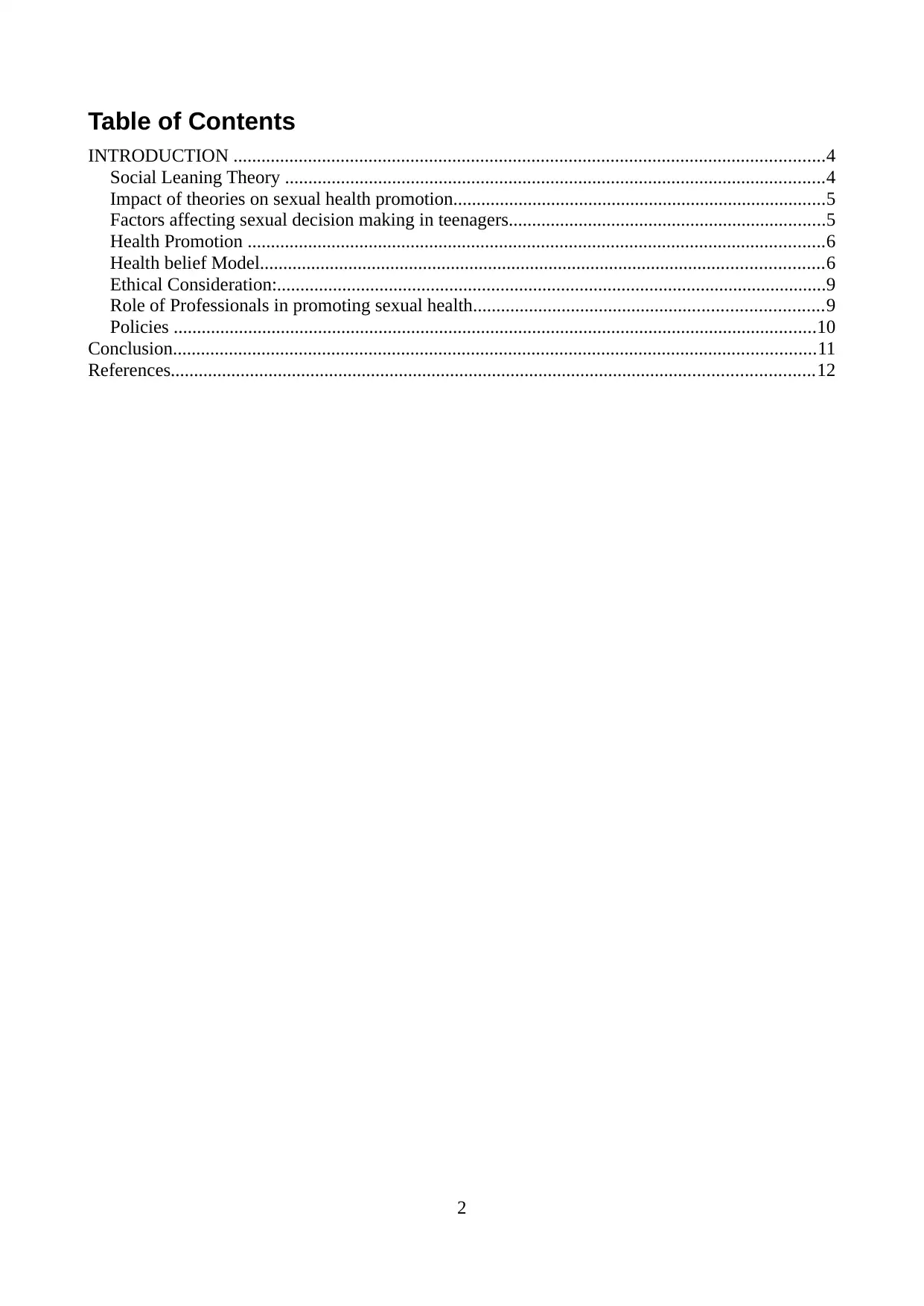
Table of Contents
INTRODUCTION ...............................................................................................................................4
Social Leaning Theory ....................................................................................................................4
Impact of theories on sexual health promotion................................................................................5
Factors affecting sexual decision making in teenagers....................................................................5
Health Promotion ............................................................................................................................6
Health belief Model.........................................................................................................................6
Ethical Consideration:......................................................................................................................9
Role of Professionals in promoting sexual health...........................................................................9
Policies ..........................................................................................................................................10
Conclusion..........................................................................................................................................11
References..........................................................................................................................................12
2
INTRODUCTION ...............................................................................................................................4
Social Leaning Theory ....................................................................................................................4
Impact of theories on sexual health promotion................................................................................5
Factors affecting sexual decision making in teenagers....................................................................5
Health Promotion ............................................................................................................................6
Health belief Model.........................................................................................................................6
Ethical Consideration:......................................................................................................................9
Role of Professionals in promoting sexual health...........................................................................9
Policies ..........................................................................................................................................10
Conclusion..........................................................................................................................................11
References..........................................................................................................................................12
2
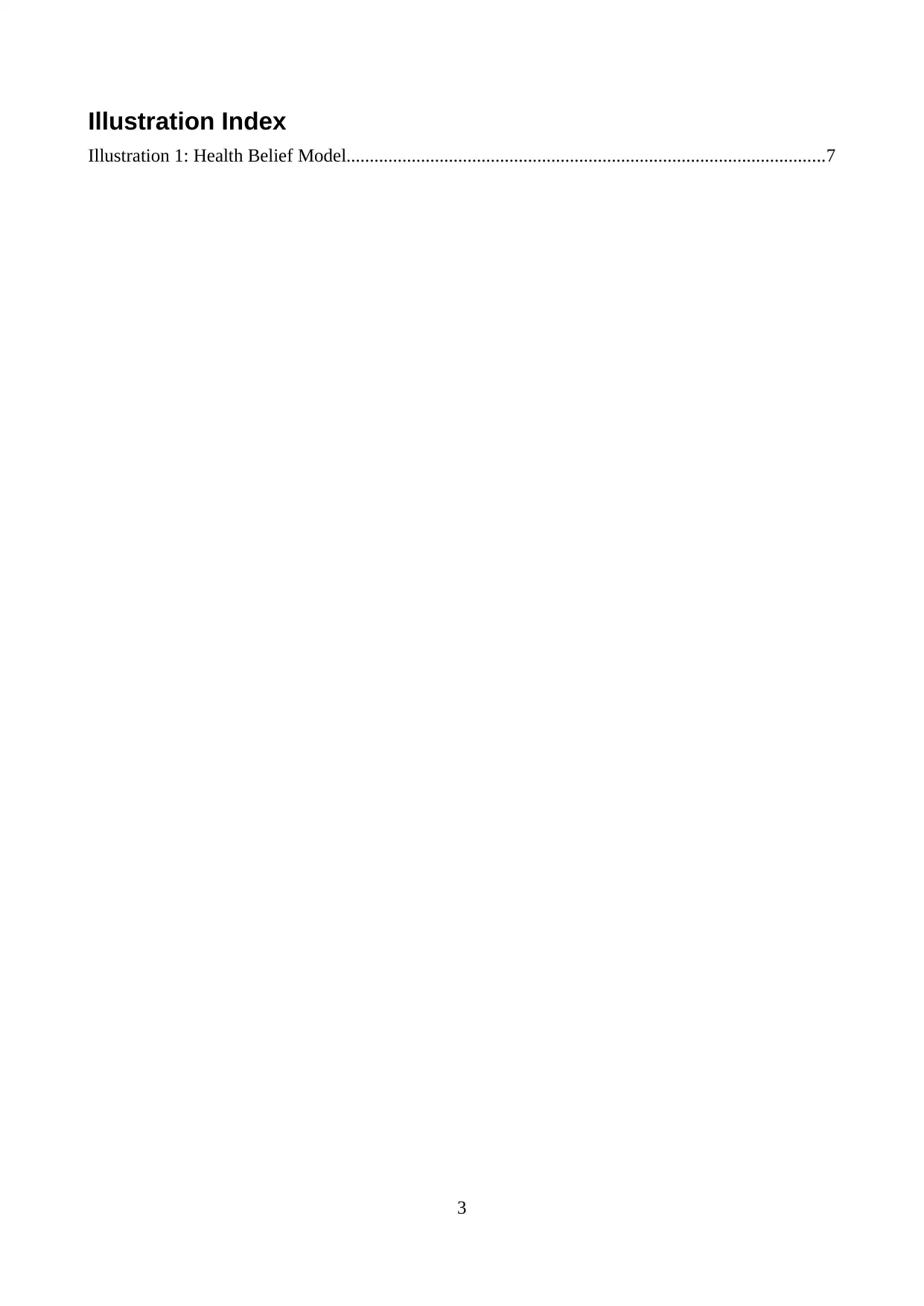
Illustration Index
Illustration 1: Health Belief Model.......................................................................................................7
3
Illustration 1: Health Belief Model.......................................................................................................7
3
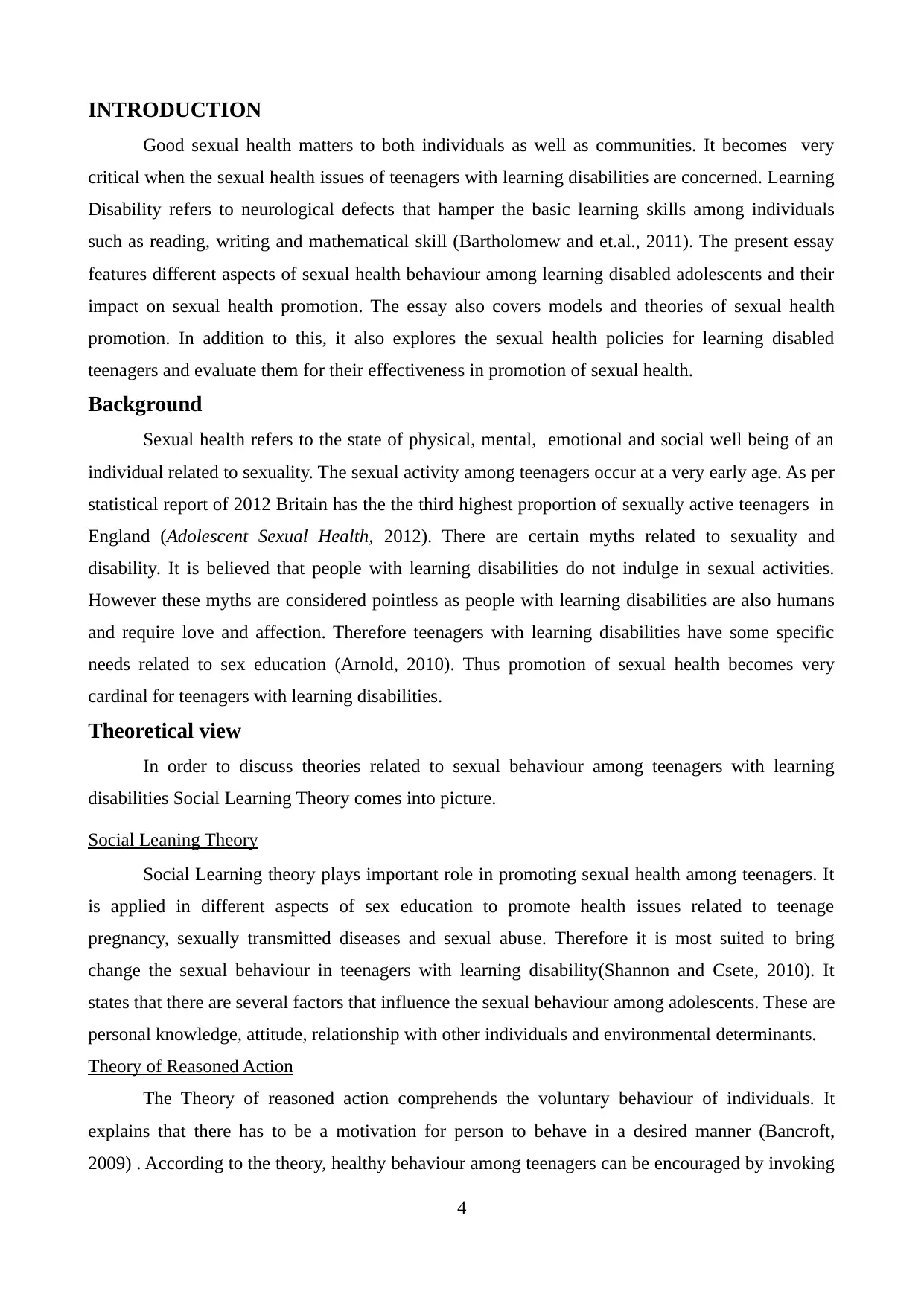
INTRODUCTION
Good sexual health matters to both individuals as well as communities. It becomes very
critical when the sexual health issues of teenagers with learning disabilities are concerned. Learning
Disability refers to neurological defects that hamper the basic learning skills among individuals
such as reading, writing and mathematical skill (Bartholomew and et.al., 2011). The present essay
features different aspects of sexual health behaviour among learning disabled adolescents and their
impact on sexual health promotion. The essay also covers models and theories of sexual health
promotion. In addition to this, it also explores the sexual health policies for learning disabled
teenagers and evaluate them for their effectiveness in promotion of sexual health.
Background
Sexual health refers to the state of physical, mental, emotional and social well being of an
individual related to sexuality. The sexual activity among teenagers occur at a very early age. As per
statistical report of 2012 Britain has the the third highest proportion of sexually active teenagers in
England (Adolescent Sexual Health, 2012). There are certain myths related to sexuality and
disability. It is believed that people with learning disabilities do not indulge in sexual activities.
However these myths are considered pointless as people with learning disabilities are also humans
and require love and affection. Therefore teenagers with learning disabilities have some specific
needs related to sex education (Arnold, 2010). Thus promotion of sexual health becomes very
cardinal for teenagers with learning disabilities.
Theoretical view
In order to discuss theories related to sexual behaviour among teenagers with learning
disabilities Social Learning Theory comes into picture.
Social Leaning Theory
Social Learning theory plays important role in promoting sexual health among teenagers. It
is applied in different aspects of sex education to promote health issues related to teenage
pregnancy, sexually transmitted diseases and sexual abuse. Therefore it is most suited to bring
change the sexual behaviour in teenagers with learning disability(Shannon and Csete, 2010). It
states that there are several factors that influence the sexual behaviour among adolescents. These are
personal knowledge, attitude, relationship with other individuals and environmental determinants.
Theory of Reasoned Action
The Theory of reasoned action comprehends the voluntary behaviour of individuals. It
explains that there has to be a motivation for person to behave in a desired manner (Bancroft,
2009) . According to the theory, healthy behaviour among teenagers can be encouraged by invoking
4
Good sexual health matters to both individuals as well as communities. It becomes very
critical when the sexual health issues of teenagers with learning disabilities are concerned. Learning
Disability refers to neurological defects that hamper the basic learning skills among individuals
such as reading, writing and mathematical skill (Bartholomew and et.al., 2011). The present essay
features different aspects of sexual health behaviour among learning disabled adolescents and their
impact on sexual health promotion. The essay also covers models and theories of sexual health
promotion. In addition to this, it also explores the sexual health policies for learning disabled
teenagers and evaluate them for their effectiveness in promotion of sexual health.
Background
Sexual health refers to the state of physical, mental, emotional and social well being of an
individual related to sexuality. The sexual activity among teenagers occur at a very early age. As per
statistical report of 2012 Britain has the the third highest proportion of sexually active teenagers in
England (Adolescent Sexual Health, 2012). There are certain myths related to sexuality and
disability. It is believed that people with learning disabilities do not indulge in sexual activities.
However these myths are considered pointless as people with learning disabilities are also humans
and require love and affection. Therefore teenagers with learning disabilities have some specific
needs related to sex education (Arnold, 2010). Thus promotion of sexual health becomes very
cardinal for teenagers with learning disabilities.
Theoretical view
In order to discuss theories related to sexual behaviour among teenagers with learning
disabilities Social Learning Theory comes into picture.
Social Leaning Theory
Social Learning theory plays important role in promoting sexual health among teenagers. It
is applied in different aspects of sex education to promote health issues related to teenage
pregnancy, sexually transmitted diseases and sexual abuse. Therefore it is most suited to bring
change the sexual behaviour in teenagers with learning disability(Shannon and Csete, 2010). It
states that there are several factors that influence the sexual behaviour among adolescents. These are
personal knowledge, attitude, relationship with other individuals and environmental determinants.
Theory of Reasoned Action
The Theory of reasoned action comprehends the voluntary behaviour of individuals. It
explains that there has to be a motivation for person to behave in a desired manner (Bancroft,
2009) . According to the theory, healthy behaviour among teenagers can be encouraged by invoking
4
Secure Best Marks with AI Grader
Need help grading? Try our AI Grader for instant feedback on your assignments.
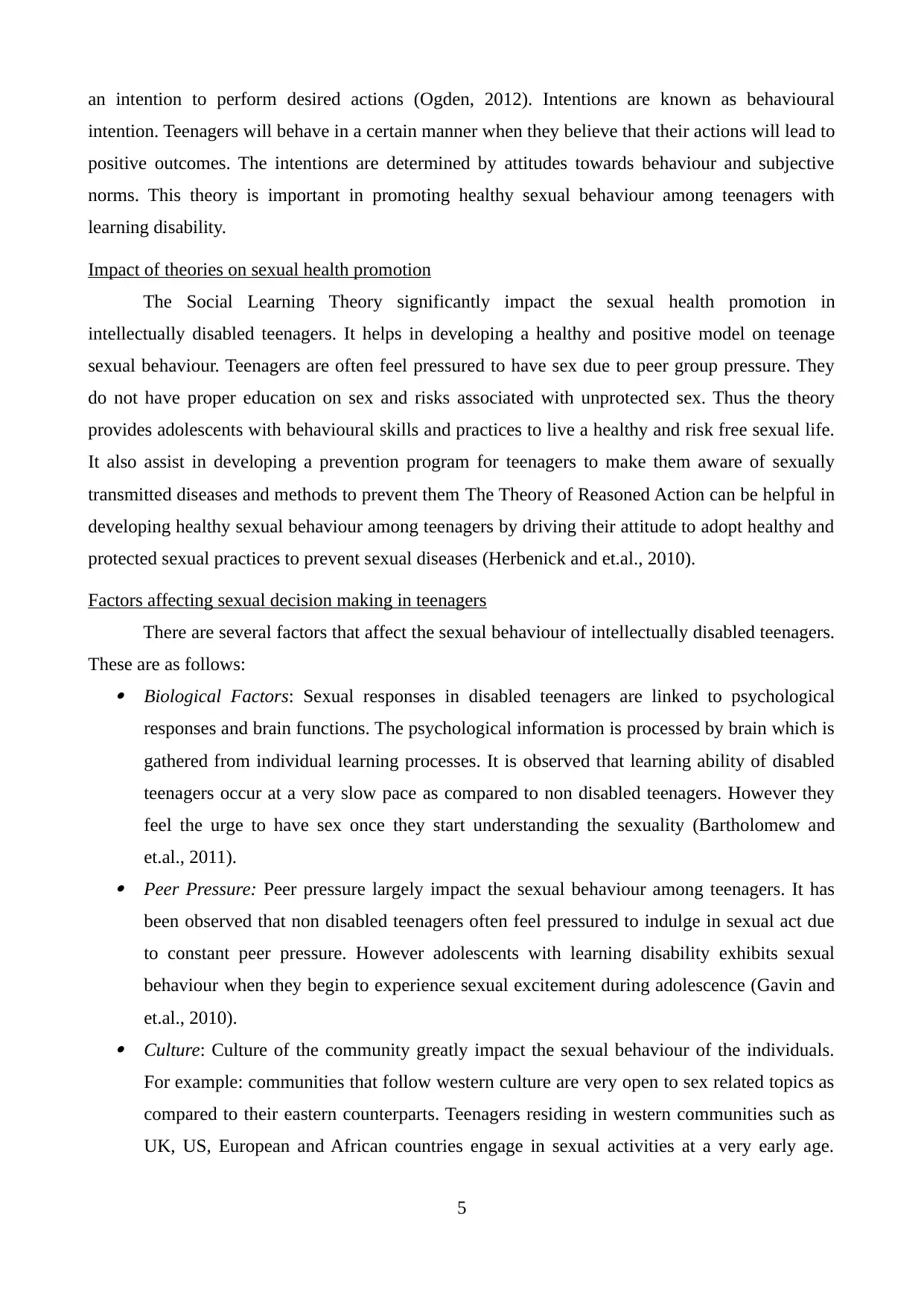
an intention to perform desired actions (Ogden, 2012). Intentions are known as behavioural
intention. Teenagers will behave in a certain manner when they believe that their actions will lead to
positive outcomes. The intentions are determined by attitudes towards behaviour and subjective
norms. This theory is important in promoting healthy sexual behaviour among teenagers with
learning disability.
Impact of theories on sexual health promotion
The Social Learning Theory significantly impact the sexual health promotion in
intellectually disabled teenagers. It helps in developing a healthy and positive model on teenage
sexual behaviour. Teenagers are often feel pressured to have sex due to peer group pressure. They
do not have proper education on sex and risks associated with unprotected sex. Thus the theory
provides adolescents with behavioural skills and practices to live a healthy and risk free sexual life.
It also assist in developing a prevention program for teenagers to make them aware of sexually
transmitted diseases and methods to prevent them The Theory of Reasoned Action can be helpful in
developing healthy sexual behaviour among teenagers by driving their attitude to adopt healthy and
protected sexual practices to prevent sexual diseases (Herbenick and et.al., 2010).
Factors affecting sexual decision making in teenagers
There are several factors that affect the sexual behaviour of intellectually disabled teenagers.
These are as follows: Biological Factors: Sexual responses in disabled teenagers are linked to psychological
responses and brain functions. The psychological information is processed by brain which is
gathered from individual learning processes. It is observed that learning ability of disabled
teenagers occur at a very slow pace as compared to non disabled teenagers. However they
feel the urge to have sex once they start understanding the sexuality (Bartholomew and
et.al., 2011). Peer Pressure: Peer pressure largely impact the sexual behaviour among teenagers. It has
been observed that non disabled teenagers often feel pressured to indulge in sexual act due
to constant peer pressure. However adolescents with learning disability exhibits sexual
behaviour when they begin to experience sexual excitement during adolescence (Gavin and
et.al., 2010). Culture: Culture of the community greatly impact the sexual behaviour of the individuals.
For example: communities that follow western culture are very open to sex related topics as
compared to their eastern counterparts. Teenagers residing in western communities such as
UK, US, European and African countries engage in sexual activities at a very early age.
5
intention. Teenagers will behave in a certain manner when they believe that their actions will lead to
positive outcomes. The intentions are determined by attitudes towards behaviour and subjective
norms. This theory is important in promoting healthy sexual behaviour among teenagers with
learning disability.
Impact of theories on sexual health promotion
The Social Learning Theory significantly impact the sexual health promotion in
intellectually disabled teenagers. It helps in developing a healthy and positive model on teenage
sexual behaviour. Teenagers are often feel pressured to have sex due to peer group pressure. They
do not have proper education on sex and risks associated with unprotected sex. Thus the theory
provides adolescents with behavioural skills and practices to live a healthy and risk free sexual life.
It also assist in developing a prevention program for teenagers to make them aware of sexually
transmitted diseases and methods to prevent them The Theory of Reasoned Action can be helpful in
developing healthy sexual behaviour among teenagers by driving their attitude to adopt healthy and
protected sexual practices to prevent sexual diseases (Herbenick and et.al., 2010).
Factors affecting sexual decision making in teenagers
There are several factors that affect the sexual behaviour of intellectually disabled teenagers.
These are as follows: Biological Factors: Sexual responses in disabled teenagers are linked to psychological
responses and brain functions. The psychological information is processed by brain which is
gathered from individual learning processes. It is observed that learning ability of disabled
teenagers occur at a very slow pace as compared to non disabled teenagers. However they
feel the urge to have sex once they start understanding the sexuality (Bartholomew and
et.al., 2011). Peer Pressure: Peer pressure largely impact the sexual behaviour among teenagers. It has
been observed that non disabled teenagers often feel pressured to indulge in sexual act due
to constant peer pressure. However adolescents with learning disability exhibits sexual
behaviour when they begin to experience sexual excitement during adolescence (Gavin and
et.al., 2010). Culture: Culture of the community greatly impact the sexual behaviour of the individuals.
For example: communities that follow western culture are very open to sex related topics as
compared to their eastern counterparts. Teenagers residing in western communities such as
UK, US, European and African countries engage in sexual activities at a very early age.
5
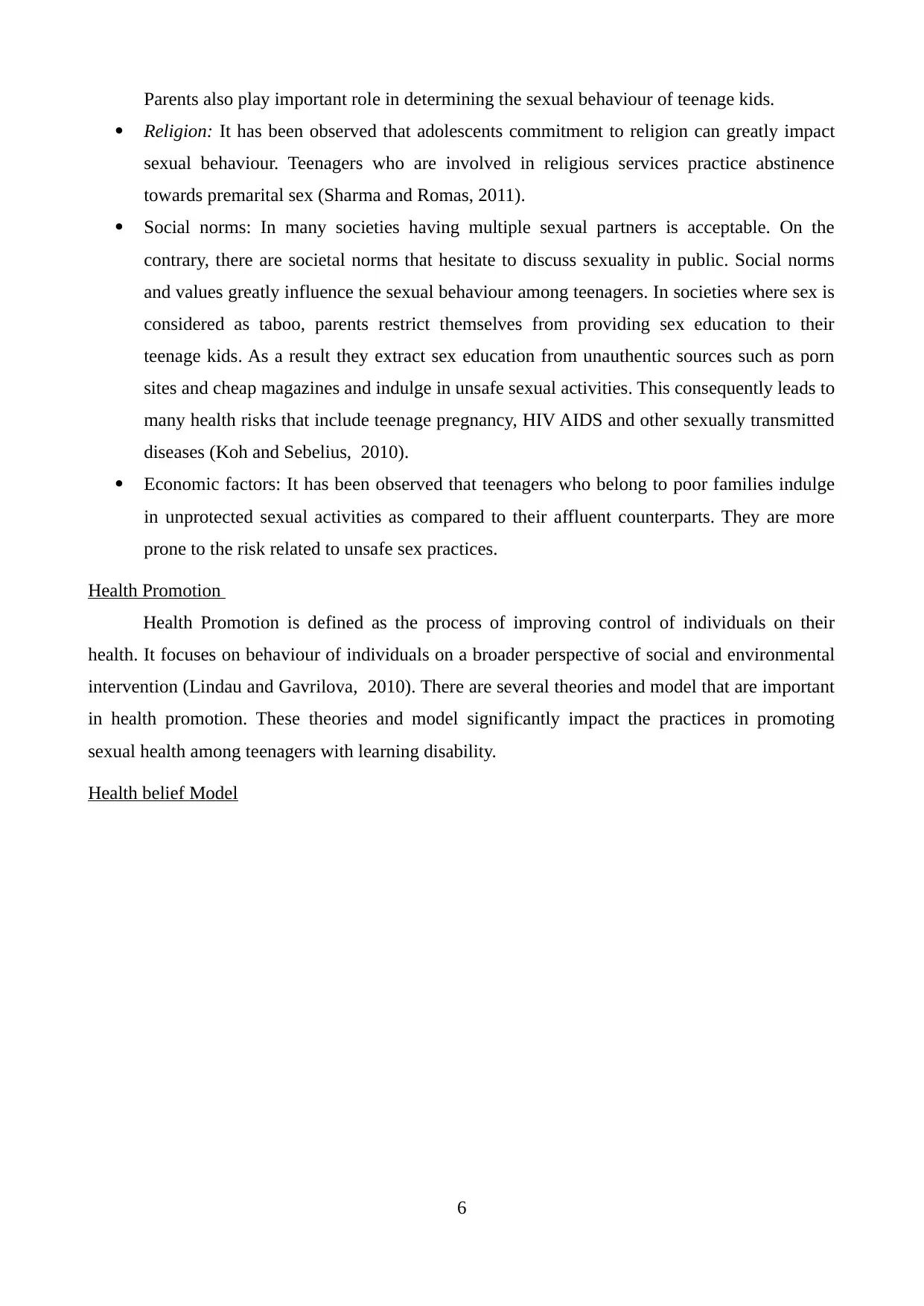
Parents also play important role in determining the sexual behaviour of teenage kids.
Religion: It has been observed that adolescents commitment to religion can greatly impact
sexual behaviour. Teenagers who are involved in religious services practice abstinence
towards premarital sex (Sharma and Romas, 2011).
Social norms: In many societies having multiple sexual partners is acceptable. On the
contrary, there are societal norms that hesitate to discuss sexuality in public. Social norms
and values greatly influence the sexual behaviour among teenagers. In societies where sex is
considered as taboo, parents restrict themselves from providing sex education to their
teenage kids. As a result they extract sex education from unauthentic sources such as porn
sites and cheap magazines and indulge in unsafe sexual activities. This consequently leads to
many health risks that include teenage pregnancy, HIV AIDS and other sexually transmitted
diseases (Koh and Sebelius, 2010).
Economic factors: It has been observed that teenagers who belong to poor families indulge
in unprotected sexual activities as compared to their affluent counterparts. They are more
prone to the risk related to unsafe sex practices.
Health Promotion
Health Promotion is defined as the process of improving control of individuals on their
health. It focuses on behaviour of individuals on a broader perspective of social and environmental
intervention (Lindau and Gavrilova, 2010). There are several theories and model that are important
in health promotion. These theories and model significantly impact the practices in promoting
sexual health among teenagers with learning disability.
Health belief Model
6
Religion: It has been observed that adolescents commitment to religion can greatly impact
sexual behaviour. Teenagers who are involved in religious services practice abstinence
towards premarital sex (Sharma and Romas, 2011).
Social norms: In many societies having multiple sexual partners is acceptable. On the
contrary, there are societal norms that hesitate to discuss sexuality in public. Social norms
and values greatly influence the sexual behaviour among teenagers. In societies where sex is
considered as taboo, parents restrict themselves from providing sex education to their
teenage kids. As a result they extract sex education from unauthentic sources such as porn
sites and cheap magazines and indulge in unsafe sexual activities. This consequently leads to
many health risks that include teenage pregnancy, HIV AIDS and other sexually transmitted
diseases (Koh and Sebelius, 2010).
Economic factors: It has been observed that teenagers who belong to poor families indulge
in unprotected sexual activities as compared to their affluent counterparts. They are more
prone to the risk related to unsafe sex practices.
Health Promotion
Health Promotion is defined as the process of improving control of individuals on their
health. It focuses on behaviour of individuals on a broader perspective of social and environmental
intervention (Lindau and Gavrilova, 2010). There are several theories and model that are important
in health promotion. These theories and model significantly impact the practices in promoting
sexual health among teenagers with learning disability.
Health belief Model
6
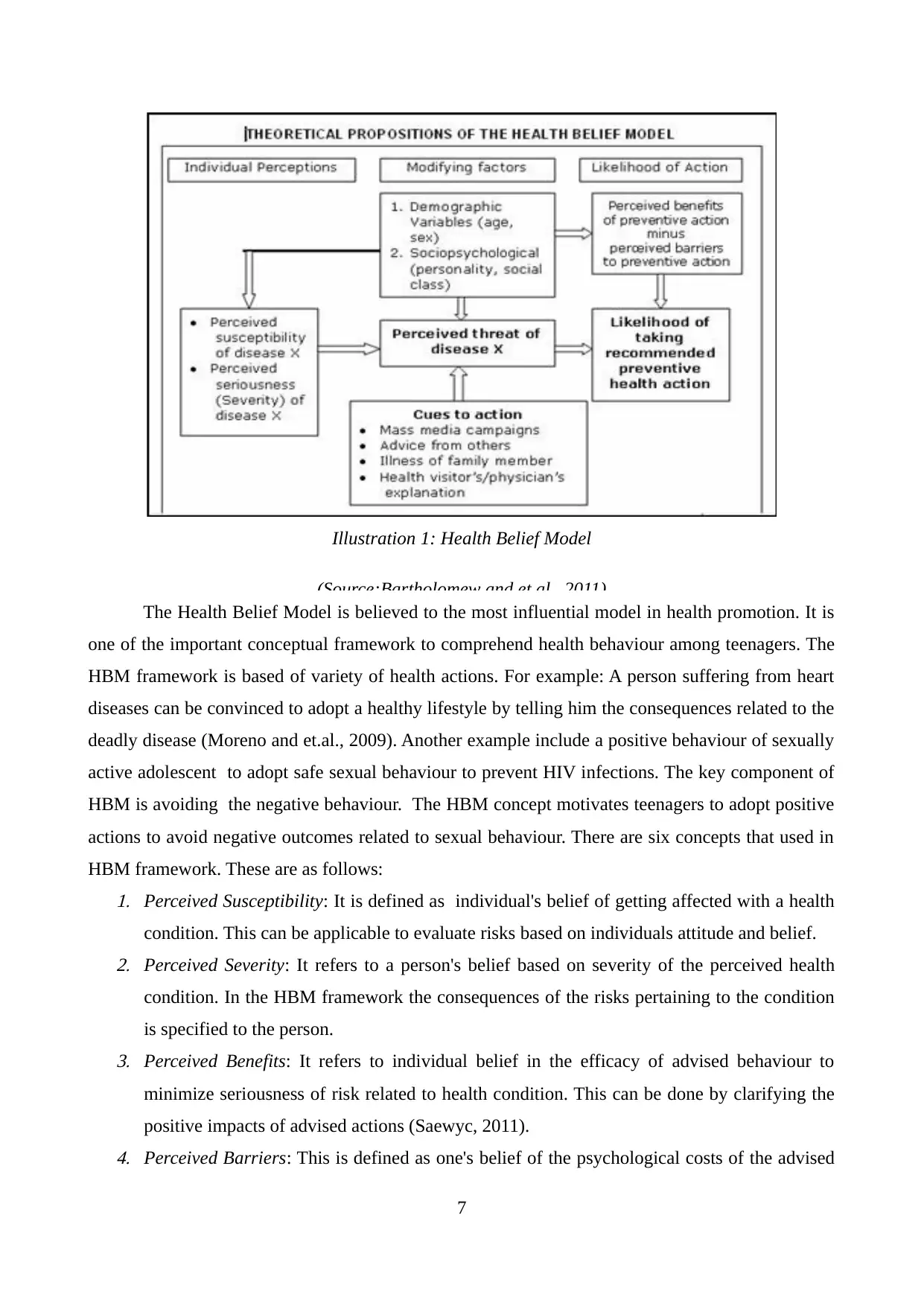
The Health Belief Model is believed to the most influential model in health promotion. It is
one of the important conceptual framework to comprehend health behaviour among teenagers. The
HBM framework is based of variety of health actions. For example: A person suffering from heart
diseases can be convinced to adopt a healthy lifestyle by telling him the consequences related to the
deadly disease (Moreno and et.al., 2009). Another example include a positive behaviour of sexually
active adolescent to adopt safe sexual behaviour to prevent HIV infections. The key component of
HBM is avoiding the negative behaviour. The HBM concept motivates teenagers to adopt positive
actions to avoid negative outcomes related to sexual behaviour. There are six concepts that used in
HBM framework. These are as follows:1. Perceived Susceptibility: It is defined as individual's belief of getting affected with a health
condition. This can be applicable to evaluate risks based on individuals attitude and belief.2. Perceived Severity: It refers to a person's belief based on severity of the perceived health
condition. In the HBM framework the consequences of the risks pertaining to the condition
is specified to the person.3. Perceived Benefits: It refers to individual belief in the efficacy of advised behaviour to
minimize seriousness of risk related to health condition. This can be done by clarifying the
positive impacts of advised actions (Saewyc, 2011).4. Perceived Barriers: This is defined as one's belief of the psychological costs of the advised
7
Illustration 1: Health Belief Model
(Source:Bartholomew and et.al., 2011)
one of the important conceptual framework to comprehend health behaviour among teenagers. The
HBM framework is based of variety of health actions. For example: A person suffering from heart
diseases can be convinced to adopt a healthy lifestyle by telling him the consequences related to the
deadly disease (Moreno and et.al., 2009). Another example include a positive behaviour of sexually
active adolescent to adopt safe sexual behaviour to prevent HIV infections. The key component of
HBM is avoiding the negative behaviour. The HBM concept motivates teenagers to adopt positive
actions to avoid negative outcomes related to sexual behaviour. There are six concepts that used in
HBM framework. These are as follows:1. Perceived Susceptibility: It is defined as individual's belief of getting affected with a health
condition. This can be applicable to evaluate risks based on individuals attitude and belief.2. Perceived Severity: It refers to a person's belief based on severity of the perceived health
condition. In the HBM framework the consequences of the risks pertaining to the condition
is specified to the person.3. Perceived Benefits: It refers to individual belief in the efficacy of advised behaviour to
minimize seriousness of risk related to health condition. This can be done by clarifying the
positive impacts of advised actions (Saewyc, 2011).4. Perceived Barriers: This is defined as one's belief of the psychological costs of the advised
7
Illustration 1: Health Belief Model
(Source:Bartholomew and et.al., 2011)
Paraphrase This Document
Need a fresh take? Get an instant paraphrase of this document with our AI Paraphraser
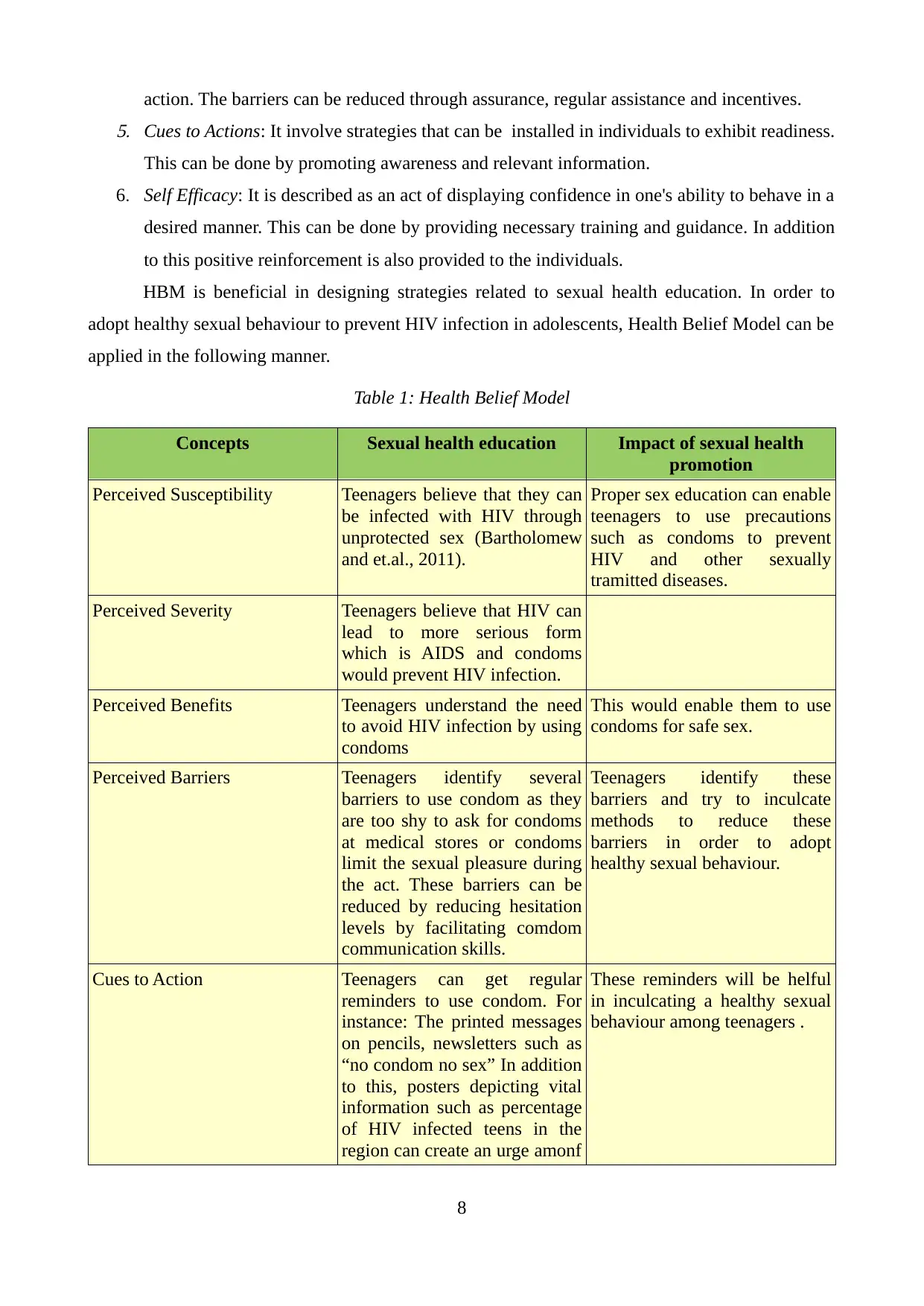
action. The barriers can be reduced through assurance, regular assistance and incentives.5. Cues to Actions: It involve strategies that can be installed in individuals to exhibit readiness.
This can be done by promoting awareness and relevant information.
6. Self Efficacy: It is described as an act of displaying confidence in one's ability to behave in a
desired manner. This can be done by providing necessary training and guidance. In addition
to this positive reinforcement is also provided to the individuals.
HBM is beneficial in designing strategies related to sexual health education. In order to
adopt healthy sexual behaviour to prevent HIV infection in adolescents, Health Belief Model can be
applied in the following manner.
Table 1: Health Belief Model
Concepts Sexual health education Impact of sexual health
promotion
Perceived Susceptibility Teenagers believe that they can
be infected with HIV through
unprotected sex (Bartholomew
and et.al., 2011).
Proper sex education can enable
teenagers to use precautions
such as condoms to prevent
HIV and other sexually
tramitted diseases.
Perceived Severity Teenagers believe that HIV can
lead to more serious form
which is AIDS and condoms
would prevent HIV infection.
Perceived Benefits Teenagers understand the need
to avoid HIV infection by using
condoms
This would enable them to use
condoms for safe sex.
Perceived Barriers Teenagers identify several
barriers to use condom as they
are too shy to ask for condoms
at medical stores or condoms
limit the sexual pleasure during
the act. These barriers can be
reduced by reducing hesitation
levels by facilitating comdom
communication skills.
Teenagers identify these
barriers and try to inculcate
methods to reduce these
barriers in order to adopt
healthy sexual behaviour.
Cues to Action Teenagers can get regular
reminders to use condom. For
instance: The printed messages
on pencils, newsletters such as
“no condom no sex” In addition
to this, posters depicting vital
information such as percentage
of HIV infected teens in the
region can create an urge amonf
These reminders will be helful
in inculcating a healthy sexual
behaviour among teenagers .
8
This can be done by promoting awareness and relevant information.
6. Self Efficacy: It is described as an act of displaying confidence in one's ability to behave in a
desired manner. This can be done by providing necessary training and guidance. In addition
to this positive reinforcement is also provided to the individuals.
HBM is beneficial in designing strategies related to sexual health education. In order to
adopt healthy sexual behaviour to prevent HIV infection in adolescents, Health Belief Model can be
applied in the following manner.
Table 1: Health Belief Model
Concepts Sexual health education Impact of sexual health
promotion
Perceived Susceptibility Teenagers believe that they can
be infected with HIV through
unprotected sex (Bartholomew
and et.al., 2011).
Proper sex education can enable
teenagers to use precautions
such as condoms to prevent
HIV and other sexually
tramitted diseases.
Perceived Severity Teenagers believe that HIV can
lead to more serious form
which is AIDS and condoms
would prevent HIV infection.
Perceived Benefits Teenagers understand the need
to avoid HIV infection by using
condoms
This would enable them to use
condoms for safe sex.
Perceived Barriers Teenagers identify several
barriers to use condom as they
are too shy to ask for condoms
at medical stores or condoms
limit the sexual pleasure during
the act. These barriers can be
reduced by reducing hesitation
levels by facilitating comdom
communication skills.
Teenagers identify these
barriers and try to inculcate
methods to reduce these
barriers in order to adopt
healthy sexual behaviour.
Cues to Action Teenagers can get regular
reminders to use condom. For
instance: The printed messages
on pencils, newsletters such as
“no condom no sex” In addition
to this, posters depicting vital
information such as percentage
of HIV infected teens in the
region can create an urge amonf
These reminders will be helful
in inculcating a healthy sexual
behaviour among teenagers .
8
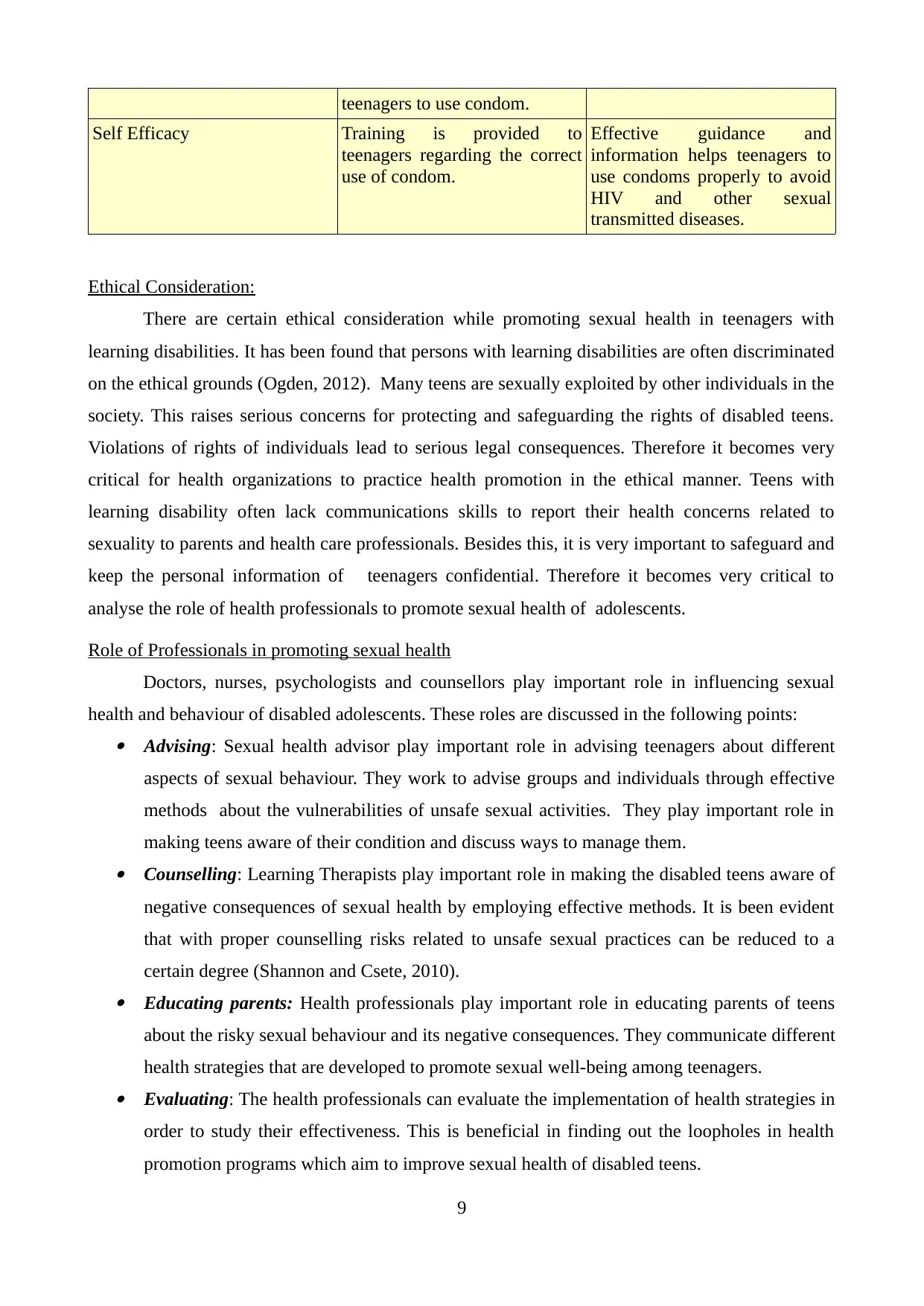
teenagers to use condom.
Self Efficacy Training is provided to
teenagers regarding the correct
use of condom.
Effective guidance and
information helps teenagers to
use condoms properly to avoid
HIV and other sexual
transmitted diseases.
Ethical Consideration:
There are certain ethical consideration while promoting sexual health in teenagers with
learning disabilities. It has been found that persons with learning disabilities are often discriminated
on the ethical grounds (Ogden, 2012). Many teens are sexually exploited by other individuals in the
society. This raises serious concerns for protecting and safeguarding the rights of disabled teens.
Violations of rights of individuals lead to serious legal consequences. Therefore it becomes very
critical for health organizations to practice health promotion in the ethical manner. Teens with
learning disability often lack communications skills to report their health concerns related to
sexuality to parents and health care professionals. Besides this, it is very important to safeguard and
keep the personal information of teenagers confidential. Therefore it becomes very critical to
analyse the role of health professionals to promote sexual health of adolescents.
Role of Professionals in promoting sexual health
Doctors, nurses, psychologists and counsellors play important role in influencing sexual
health and behaviour of disabled adolescents. These roles are discussed in the following points: Advising: Sexual health advisor play important role in advising teenagers about different
aspects of sexual behaviour. They work to advise groups and individuals through effective
methods about the vulnerabilities of unsafe sexual activities. They play important role in
making teens aware of their condition and discuss ways to manage them. Counselling: Learning Therapists play important role in making the disabled teens aware of
negative consequences of sexual health by employing effective methods. It is been evident
that with proper counselling risks related to unsafe sexual practices can be reduced to a
certain degree (Shannon and Csete, 2010). Educating parents: Health professionals play important role in educating parents of teens
about the risky sexual behaviour and its negative consequences. They communicate different
health strategies that are developed to promote sexual well-being among teenagers. Evaluating: The health professionals can evaluate the implementation of health strategies in
order to study their effectiveness. This is beneficial in finding out the loopholes in health
promotion programs which aim to improve sexual health of disabled teens.
9
Self Efficacy Training is provided to
teenagers regarding the correct
use of condom.
Effective guidance and
information helps teenagers to
use condoms properly to avoid
HIV and other sexual
transmitted diseases.
Ethical Consideration:
There are certain ethical consideration while promoting sexual health in teenagers with
learning disabilities. It has been found that persons with learning disabilities are often discriminated
on the ethical grounds (Ogden, 2012). Many teens are sexually exploited by other individuals in the
society. This raises serious concerns for protecting and safeguarding the rights of disabled teens.
Violations of rights of individuals lead to serious legal consequences. Therefore it becomes very
critical for health organizations to practice health promotion in the ethical manner. Teens with
learning disability often lack communications skills to report their health concerns related to
sexuality to parents and health care professionals. Besides this, it is very important to safeguard and
keep the personal information of teenagers confidential. Therefore it becomes very critical to
analyse the role of health professionals to promote sexual health of adolescents.
Role of Professionals in promoting sexual health
Doctors, nurses, psychologists and counsellors play important role in influencing sexual
health and behaviour of disabled adolescents. These roles are discussed in the following points: Advising: Sexual health advisor play important role in advising teenagers about different
aspects of sexual behaviour. They work to advise groups and individuals through effective
methods about the vulnerabilities of unsafe sexual activities. They play important role in
making teens aware of their condition and discuss ways to manage them. Counselling: Learning Therapists play important role in making the disabled teens aware of
negative consequences of sexual health by employing effective methods. It is been evident
that with proper counselling risks related to unsafe sexual practices can be reduced to a
certain degree (Shannon and Csete, 2010). Educating parents: Health professionals play important role in educating parents of teens
about the risky sexual behaviour and its negative consequences. They communicate different
health strategies that are developed to promote sexual well-being among teenagers. Evaluating: The health professionals can evaluate the implementation of health strategies in
order to study their effectiveness. This is beneficial in finding out the loopholes in health
promotion programs which aim to improve sexual health of disabled teens.
9
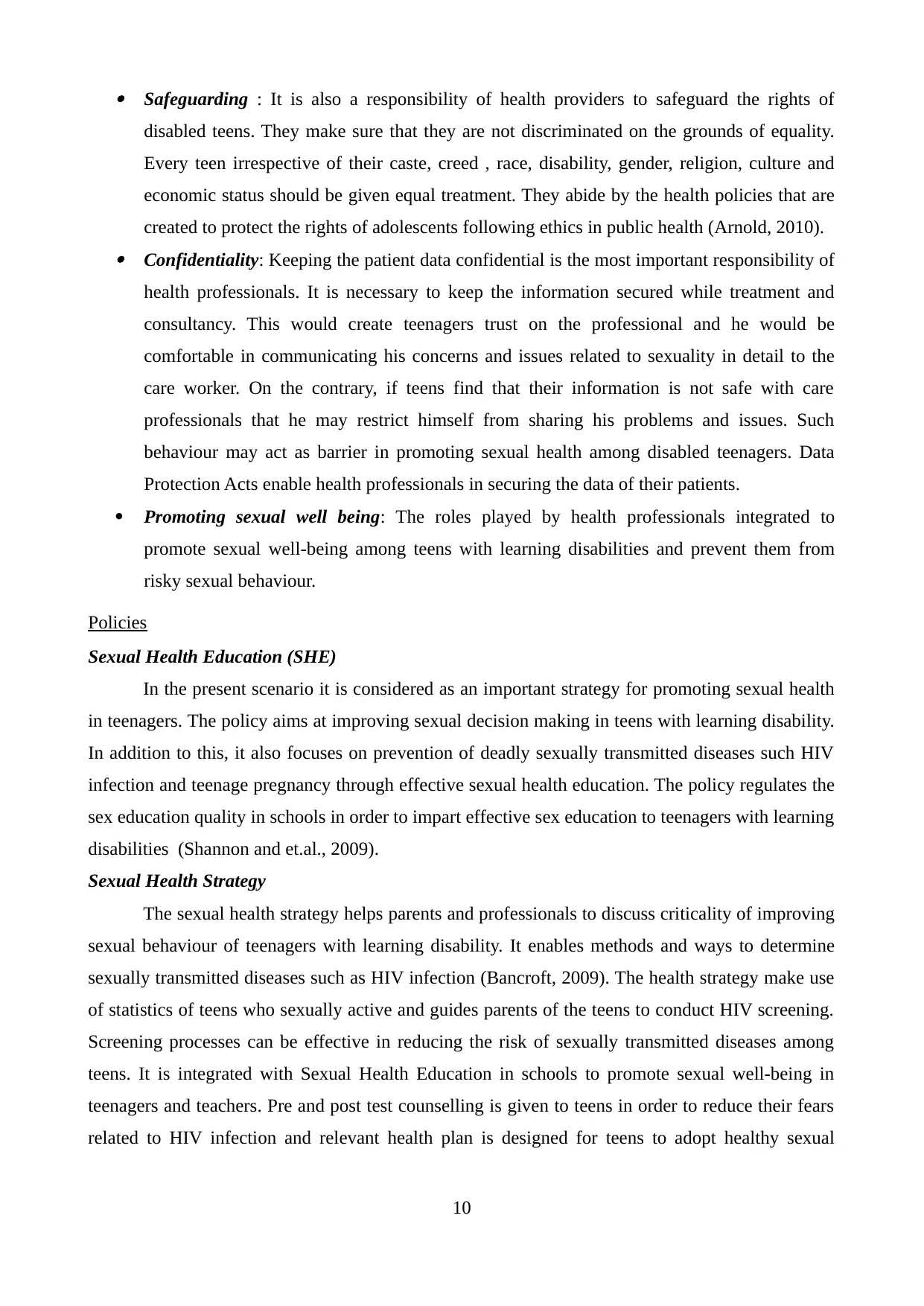
Safeguarding : It is also a responsibility of health providers to safeguard the rights of
disabled teens. They make sure that they are not discriminated on the grounds of equality.
Every teen irrespective of their caste, creed , race, disability, gender, religion, culture and
economic status should be given equal treatment. They abide by the health policies that are
created to protect the rights of adolescents following ethics in public health (Arnold, 2010). Confidentiality: Keeping the patient data confidential is the most important responsibility of
health professionals. It is necessary to keep the information secured while treatment and
consultancy. This would create teenagers trust on the professional and he would be
comfortable in communicating his concerns and issues related to sexuality in detail to the
care worker. On the contrary, if teens find that their information is not safe with care
professionals that he may restrict himself from sharing his problems and issues. Such
behaviour may act as barrier in promoting sexual health among disabled teenagers. Data
Protection Acts enable health professionals in securing the data of their patients.
Promoting sexual well being: The roles played by health professionals integrated to
promote sexual well-being among teens with learning disabilities and prevent them from
risky sexual behaviour.
Policies
Sexual Health Education (SHE)
In the present scenario it is considered as an important strategy for promoting sexual health
in teenagers. The policy aims at improving sexual decision making in teens with learning disability.
In addition to this, it also focuses on prevention of deadly sexually transmitted diseases such HIV
infection and teenage pregnancy through effective sexual health education. The policy regulates the
sex education quality in schools in order to impart effective sex education to teenagers with learning
disabilities (Shannon and et.al., 2009).
Sexual Health Strategy
The sexual health strategy helps parents and professionals to discuss criticality of improving
sexual behaviour of teenagers with learning disability. It enables methods and ways to determine
sexually transmitted diseases such as HIV infection (Bancroft, 2009). The health strategy make use
of statistics of teens who sexually active and guides parents of the teens to conduct HIV screening.
Screening processes can be effective in reducing the risk of sexually transmitted diseases among
teens. It is integrated with Sexual Health Education in schools to promote sexual well-being in
teenagers and teachers. Pre and post test counselling is given to teens in order to reduce their fears
related to HIV infection and relevant health plan is designed for teens to adopt healthy sexual
10
disabled teens. They make sure that they are not discriminated on the grounds of equality.
Every teen irrespective of their caste, creed , race, disability, gender, religion, culture and
economic status should be given equal treatment. They abide by the health policies that are
created to protect the rights of adolescents following ethics in public health (Arnold, 2010). Confidentiality: Keeping the patient data confidential is the most important responsibility of
health professionals. It is necessary to keep the information secured while treatment and
consultancy. This would create teenagers trust on the professional and he would be
comfortable in communicating his concerns and issues related to sexuality in detail to the
care worker. On the contrary, if teens find that their information is not safe with care
professionals that he may restrict himself from sharing his problems and issues. Such
behaviour may act as barrier in promoting sexual health among disabled teenagers. Data
Protection Acts enable health professionals in securing the data of their patients.
Promoting sexual well being: The roles played by health professionals integrated to
promote sexual well-being among teens with learning disabilities and prevent them from
risky sexual behaviour.
Policies
Sexual Health Education (SHE)
In the present scenario it is considered as an important strategy for promoting sexual health
in teenagers. The policy aims at improving sexual decision making in teens with learning disability.
In addition to this, it also focuses on prevention of deadly sexually transmitted diseases such HIV
infection and teenage pregnancy through effective sexual health education. The policy regulates the
sex education quality in schools in order to impart effective sex education to teenagers with learning
disabilities (Shannon and et.al., 2009).
Sexual Health Strategy
The sexual health strategy helps parents and professionals to discuss criticality of improving
sexual behaviour of teenagers with learning disability. It enables methods and ways to determine
sexually transmitted diseases such as HIV infection (Bancroft, 2009). The health strategy make use
of statistics of teens who sexually active and guides parents of the teens to conduct HIV screening.
Screening processes can be effective in reducing the risk of sexually transmitted diseases among
teens. It is integrated with Sexual Health Education in schools to promote sexual well-being in
teenagers and teachers. Pre and post test counselling is given to teens in order to reduce their fears
related to HIV infection and relevant health plan is designed for teens to adopt healthy sexual
10
Secure Best Marks with AI Grader
Need help grading? Try our AI Grader for instant feedback on your assignments.
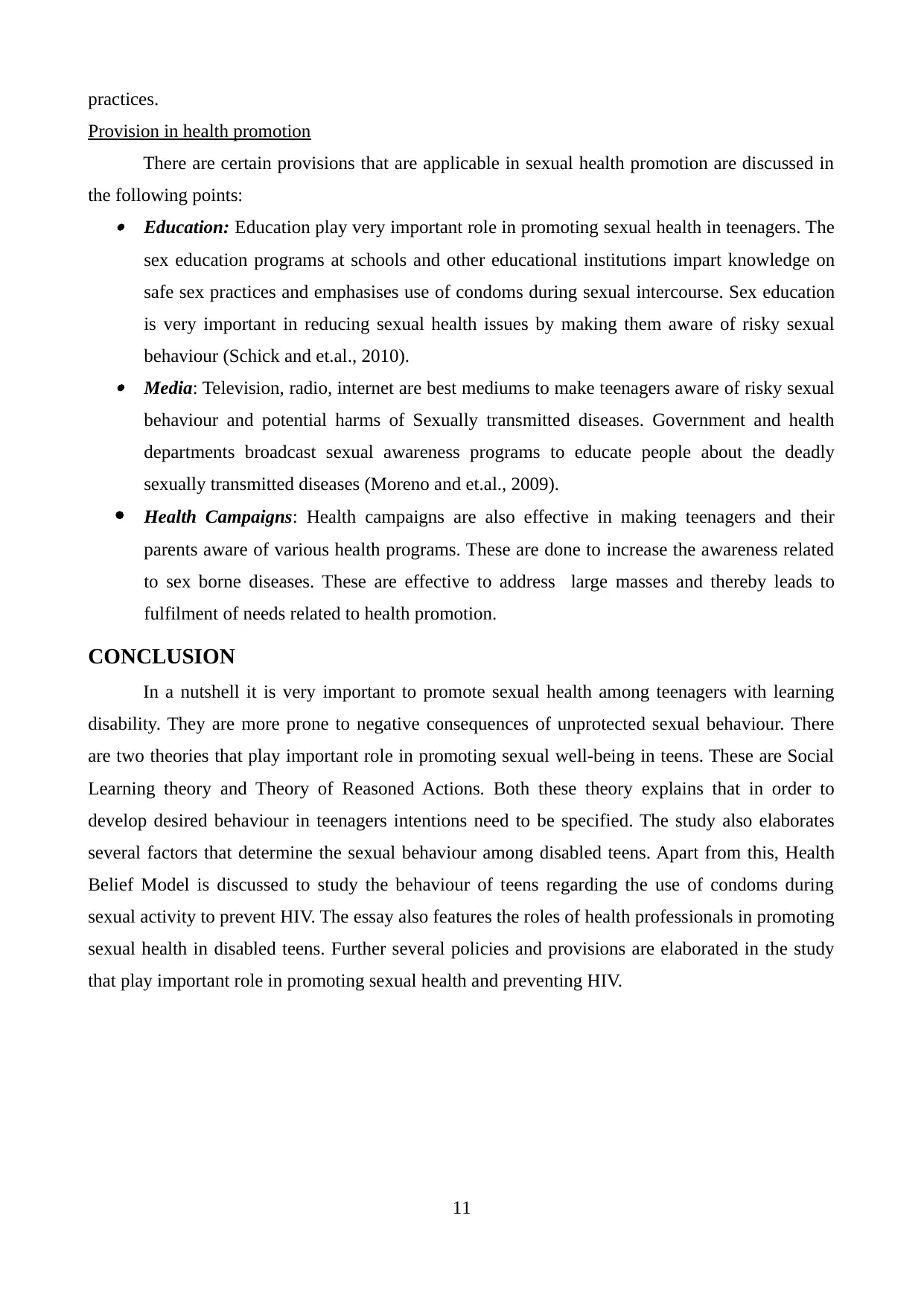
practices.
Provision in health promotion
There are certain provisions that are applicable in sexual health promotion are discussed in
the following points: Education: Education play very important role in promoting sexual health in teenagers. The
sex education programs at schools and other educational institutions impart knowledge on
safe sex practices and emphasises use of condoms during sexual intercourse. Sex education
is very important in reducing sexual health issues by making them aware of risky sexual
behaviour (Schick and et.al., 2010). Media: Television, radio, internet are best mediums to make teenagers aware of risky sexual
behaviour and potential harms of Sexually transmitted diseases. Government and health
departments broadcast sexual awareness programs to educate people about the deadly
sexually transmitted diseases (Moreno and et.al., 2009).
Health Campaigns: Health campaigns are also effective in making teenagers and their
parents aware of various health programs. These are done to increase the awareness related
to sex borne diseases. These are effective to address large masses and thereby leads to
fulfilment of needs related to health promotion.
CONCLUSION
In a nutshell it is very important to promote sexual health among teenagers with learning
disability. They are more prone to negative consequences of unprotected sexual behaviour. There
are two theories that play important role in promoting sexual well-being in teens. These are Social
Learning theory and Theory of Reasoned Actions. Both these theory explains that in order to
develop desired behaviour in teenagers intentions need to be specified. The study also elaborates
several factors that determine the sexual behaviour among disabled teens. Apart from this, Health
Belief Model is discussed to study the behaviour of teens regarding the use of condoms during
sexual activity to prevent HIV. The essay also features the roles of health professionals in promoting
sexual health in disabled teens. Further several policies and provisions are elaborated in the study
that play important role in promoting sexual health and preventing HIV.
11
Provision in health promotion
There are certain provisions that are applicable in sexual health promotion are discussed in
the following points: Education: Education play very important role in promoting sexual health in teenagers. The
sex education programs at schools and other educational institutions impart knowledge on
safe sex practices and emphasises use of condoms during sexual intercourse. Sex education
is very important in reducing sexual health issues by making them aware of risky sexual
behaviour (Schick and et.al., 2010). Media: Television, radio, internet are best mediums to make teenagers aware of risky sexual
behaviour and potential harms of Sexually transmitted diseases. Government and health
departments broadcast sexual awareness programs to educate people about the deadly
sexually transmitted diseases (Moreno and et.al., 2009).
Health Campaigns: Health campaigns are also effective in making teenagers and their
parents aware of various health programs. These are done to increase the awareness related
to sex borne diseases. These are effective to address large masses and thereby leads to
fulfilment of needs related to health promotion.
CONCLUSION
In a nutshell it is very important to promote sexual health among teenagers with learning
disability. They are more prone to negative consequences of unprotected sexual behaviour. There
are two theories that play important role in promoting sexual well-being in teens. These are Social
Learning theory and Theory of Reasoned Actions. Both these theory explains that in order to
develop desired behaviour in teenagers intentions need to be specified. The study also elaborates
several factors that determine the sexual behaviour among disabled teens. Apart from this, Health
Belief Model is discussed to study the behaviour of teens regarding the use of condoms during
sexual activity to prevent HIV. The essay also features the roles of health professionals in promoting
sexual health in disabled teens. Further several policies and provisions are elaborated in the study
that play important role in promoting sexual health and preventing HIV.
11
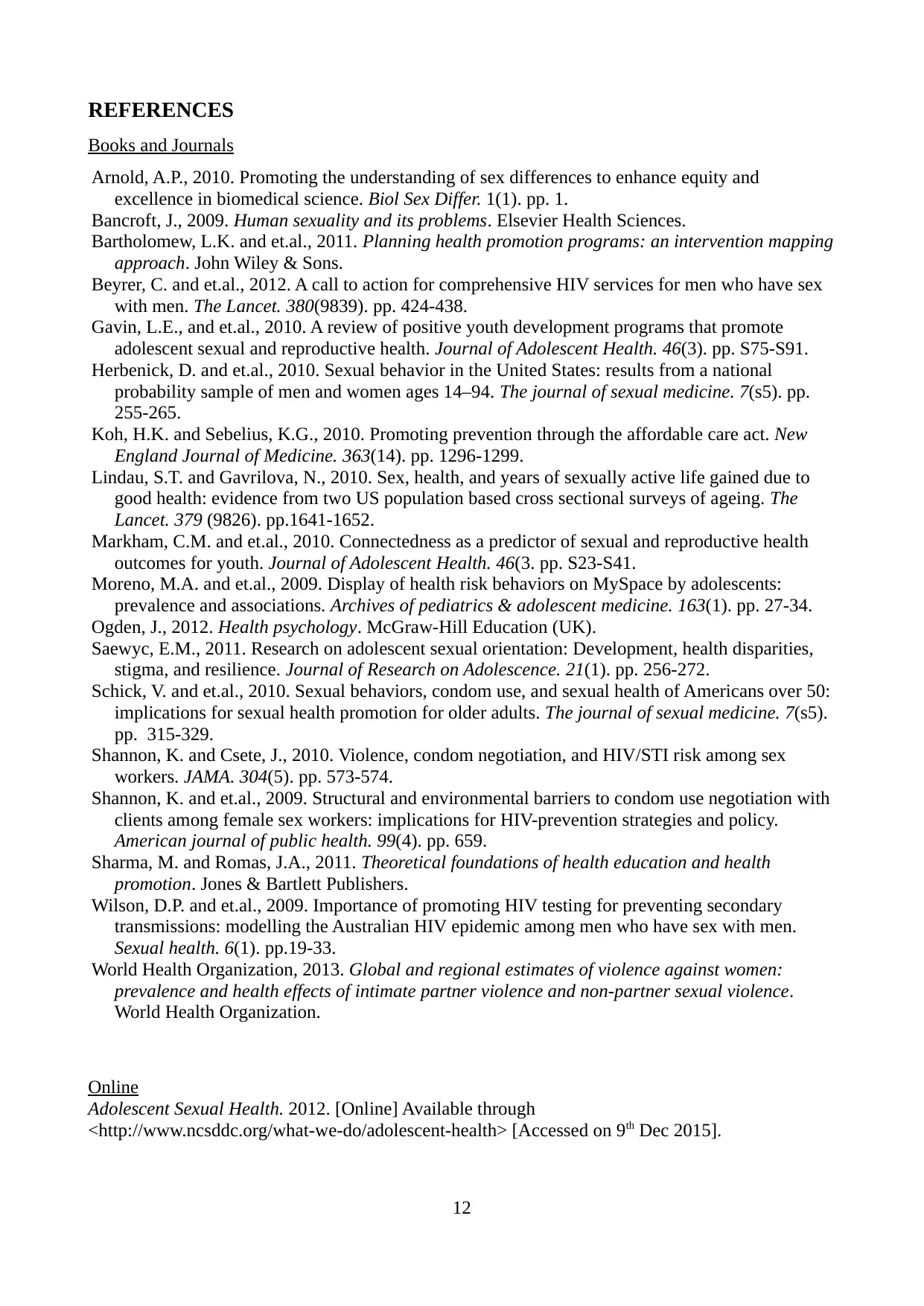
REFERENCES
Books and Journals
Arnold, A.P., 2010. Promoting the understanding of sex differences to enhance equity and
excellence in biomedical science. Biol Sex Differ. 1(1). pp. 1.
Bancroft, J., 2009. Human sexuality and its problems. Elsevier Health Sciences.
Bartholomew, L.K. and et.al., 2011. Planning health promotion programs: an intervention mapping
approach. John Wiley & Sons.
Beyrer, C. and et.al., 2012. A call to action for comprehensive HIV services for men who have sex
with men. The Lancet. 380(9839). pp. 424-438.
Gavin, L.E., and et.al., 2010. A review of positive youth development programs that promote
adolescent sexual and reproductive health. Journal of Adolescent Health. 46(3). pp. S75-S91.
Herbenick, D. and et.al., 2010. Sexual behavior in the United States: results from a national
probability sample of men and women ages 14–94. The journal of sexual medicine. 7(s5). pp.
255-265.
Koh, H.K. and Sebelius, K.G., 2010. Promoting prevention through the affordable care act. New
England Journal of Medicine. 363(14). pp. 1296-1299.
Lindau, S.T. and Gavrilova, N., 2010. Sex, health, and years of sexually active life gained due to
good health: evidence from two US population based cross sectional surveys of ageing. The
Lancet. 379 (9826). pp.1641-1652.
Markham, C.M. and et.al., 2010. Connectedness as a predictor of sexual and reproductive health
outcomes for youth. Journal of Adolescent Health. 46(3. pp. S23-S41.
Moreno, M.A. and et.al., 2009. Display of health risk behaviors on MySpace by adolescents:
prevalence and associations. Archives of pediatrics & adolescent medicine. 163(1). pp. 27-34.
Ogden, J., 2012. Health psychology. McGraw-Hill Education (UK).
Saewyc, E.M., 2011. Research on adolescent sexual orientation: Development, health disparities,
stigma, and resilience. Journal of Research on Adolescence. 21(1). pp. 256-272.
Schick, V. and et.al., 2010. Sexual behaviors, condom use, and sexual health of Americans over 50:
implications for sexual health promotion for older adults. The journal of sexual medicine. 7(s5).
pp. 315-329.
Shannon, K. and Csete, J., 2010. Violence, condom negotiation, and HIV/STI risk among sex
workers. JAMA. 304(5). pp. 573-574.
Shannon, K. and et.al., 2009. Structural and environmental barriers to condom use negotiation with
clients among female sex workers: implications for HIV-prevention strategies and policy.
American journal of public health. 99(4). pp. 659.
Sharma, M. and Romas, J.A., 2011. Theoretical foundations of health education and health
promotion. Jones & Bartlett Publishers.
Wilson, D.P. and et.al., 2009. Importance of promoting HIV testing for preventing secondary
transmissions: modelling the Australian HIV epidemic among men who have sex with men.
Sexual health. 6(1). pp.19-33.
World Health Organization, 2013. Global and regional estimates of violence against women:
prevalence and health effects of intimate partner violence and non-partner sexual violence.
World Health Organization.
Online
Adolescent Sexual Health. 2012. [Online] Available through
<http://www.ncsddc.org/what-we-do/adolescent-health> [Accessed on 9th Dec 2015].
12
Books and Journals
Arnold, A.P., 2010. Promoting the understanding of sex differences to enhance equity and
excellence in biomedical science. Biol Sex Differ. 1(1). pp. 1.
Bancroft, J., 2009. Human sexuality and its problems. Elsevier Health Sciences.
Bartholomew, L.K. and et.al., 2011. Planning health promotion programs: an intervention mapping
approach. John Wiley & Sons.
Beyrer, C. and et.al., 2012. A call to action for comprehensive HIV services for men who have sex
with men. The Lancet. 380(9839). pp. 424-438.
Gavin, L.E., and et.al., 2010. A review of positive youth development programs that promote
adolescent sexual and reproductive health. Journal of Adolescent Health. 46(3). pp. S75-S91.
Herbenick, D. and et.al., 2010. Sexual behavior in the United States: results from a national
probability sample of men and women ages 14–94. The journal of sexual medicine. 7(s5). pp.
255-265.
Koh, H.K. and Sebelius, K.G., 2010. Promoting prevention through the affordable care act. New
England Journal of Medicine. 363(14). pp. 1296-1299.
Lindau, S.T. and Gavrilova, N., 2010. Sex, health, and years of sexually active life gained due to
good health: evidence from two US population based cross sectional surveys of ageing. The
Lancet. 379 (9826). pp.1641-1652.
Markham, C.M. and et.al., 2010. Connectedness as a predictor of sexual and reproductive health
outcomes for youth. Journal of Adolescent Health. 46(3. pp. S23-S41.
Moreno, M.A. and et.al., 2009. Display of health risk behaviors on MySpace by adolescents:
prevalence and associations. Archives of pediatrics & adolescent medicine. 163(1). pp. 27-34.
Ogden, J., 2012. Health psychology. McGraw-Hill Education (UK).
Saewyc, E.M., 2011. Research on adolescent sexual orientation: Development, health disparities,
stigma, and resilience. Journal of Research on Adolescence. 21(1). pp. 256-272.
Schick, V. and et.al., 2010. Sexual behaviors, condom use, and sexual health of Americans over 50:
implications for sexual health promotion for older adults. The journal of sexual medicine. 7(s5).
pp. 315-329.
Shannon, K. and Csete, J., 2010. Violence, condom negotiation, and HIV/STI risk among sex
workers. JAMA. 304(5). pp. 573-574.
Shannon, K. and et.al., 2009. Structural and environmental barriers to condom use negotiation with
clients among female sex workers: implications for HIV-prevention strategies and policy.
American journal of public health. 99(4). pp. 659.
Sharma, M. and Romas, J.A., 2011. Theoretical foundations of health education and health
promotion. Jones & Bartlett Publishers.
Wilson, D.P. and et.al., 2009. Importance of promoting HIV testing for preventing secondary
transmissions: modelling the Australian HIV epidemic among men who have sex with men.
Sexual health. 6(1). pp.19-33.
World Health Organization, 2013. Global and regional estimates of violence against women:
prevalence and health effects of intimate partner violence and non-partner sexual violence.
World Health Organization.
Online
Adolescent Sexual Health. 2012. [Online] Available through
<http://www.ncsddc.org/what-we-do/adolescent-health> [Accessed on 9th Dec 2015].
12

13
1 out of 13
Related Documents
Your All-in-One AI-Powered Toolkit for Academic Success.
+13062052269
info@desklib.com
Available 24*7 on WhatsApp / Email
![[object Object]](/_next/static/media/star-bottom.7253800d.svg)
Unlock your academic potential
© 2024 | Zucol Services PVT LTD | All rights reserved.





